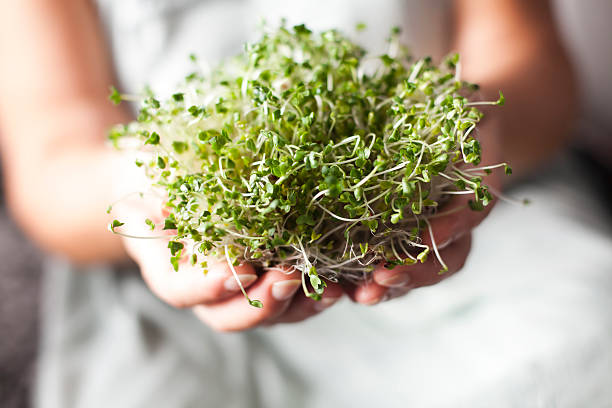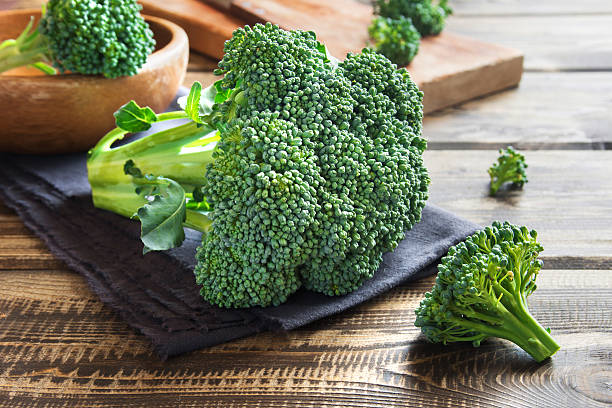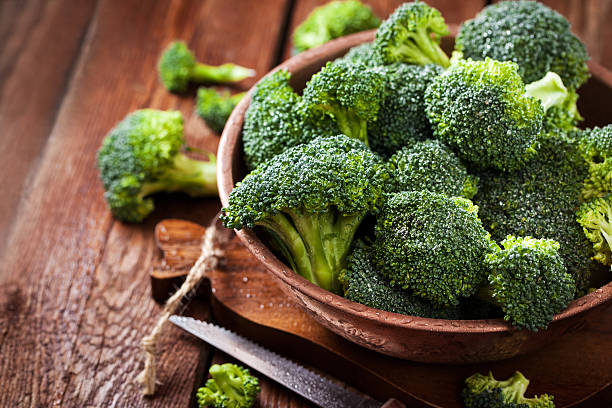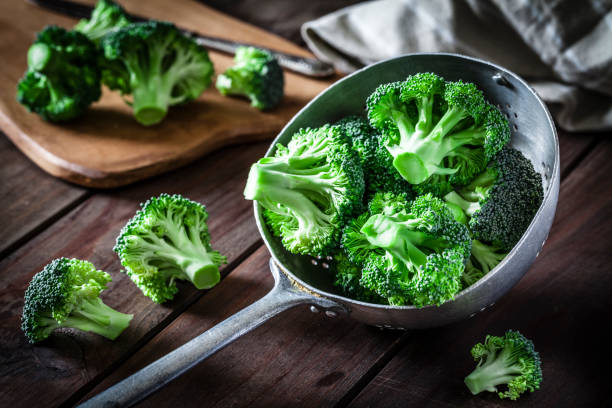Boost Your Eye Health with Broccoli and Brussels Sprouts
When it comes to protecting your vision, your diet plays a big role. What you eat can either help or hurt your eye health. Broccoli and Brussels sprouts aren’t just ordinary green vegetables—they’re vision-boosting powerhouses! These tasty veggies are loaded with eye-friendly nutrients like vitamin C, lutein, and zeaxanthin.
These nutrients help protect your eyes from damage, reduce the risk of age-related vision problems, and support overall eye health. Adding more of these cruciferous vegetables to your meals is a smart and simple way to keep your eyes healthy for years to come.
In this blog post, we’ll take a closer look at how broccoli and Brussels sprouts support healthy vision. We’ll break down the science behind their eye health benefits, explain which nutrients make them so powerful, and share easy tips for adding these green veggies to your daily meals. Whether you’re looking to protect your eyes or simply eat healthier, this guide will help you get started.
Why Eye Health Matters
Our eyes allow us to see and enjoy the world around us, but many people don’t think about eye health until problems start. Age-related eye conditions like macular degeneration, cataracts, and dry eyes are becoming more common. The good news is that eating the right foods can help slow down or even prevent some of these issues. Making smart choices in your diet is a simple way to protect your vision as you get older.
A balanced diet full of antioxidants and essential nutrients is important for keeping your eyes strong and sharp. That’s why including vegetables like broccoli and Brussels sprouts in your meals is so helpful! These green veggies are packed with powerful nutrients that protect your eyes from damage and support healthy vision. Adding them regularly to your diet can make a big difference in maintaining good eye health over time.

Nutrients in Broccoli and Brussels Sprouts That Support Vision
1. Lutein and Zeaxanthin: Nature’s Sunglasses
Broccoli and Brussels sprouts are rich sources of powerful antioxidants like lutein and zeaxanthin. These important nutrients gather in the retina, the part of your eye that helps you see clearly. They protect your eyes by:
- Filtering harmful blue light
- Fighting oxidative stress that can damage eye cells
- Lowering your risk of macular degeneration and cataracts
The American Optometric Association highlights that lutein and zeaxanthin are essential for healthy vision and may help reduce the chance of developing chronic eye diseases (source). Adding these vegetables to your diet is a smart way to support your eye health naturally.
2. Vitamin C: Antioxidant for Clear Vision
Broccoli and Brussels sprouts are packed with vitamin C, a powerful antioxidant that helps keep your eyes healthy. This nutrient:
- Helps prevent cataracts from forming
- Shields your eyes from damage by free radicals
- Supports strong, healthy blood vessels in the eyes
Plus, one cup of cooked Brussels sprouts gives you more than 100% of your daily vitamin C needs! Adding these green veggies to your meals is an easy way to boost your eye health and overall wellness.s!
3. Vitamin A and Beta-Carotene
While broccoli and Brussels sprouts don’t have as much beta-carotene as carrots, they still provide a good amount of vitamin A. This important nutrient plays a key role in keeping your eyes healthy by helping to:
- Maintain healthy corneas, the clear outer layer of your eyes
- Support your vision in low-light conditions
- Prevent night blindness, which makes it hard to see in the dark
Including these vegetables in your diet adds valuable vitamin A that supports your overall eye health.
4. Vitamin K and Eye Function
Vitamin K, which is found in high amounts in broccoli and Brussels sprouts, plays an important role in keeping your blood vessels healthy. Good blood flow is essential because it helps the retina and optic nerve work properly. When these parts of your eye get the nutrients and oxygen they need, your vision stays clear and sharp. Adding these veggies to your meals can support strong eye health through better circulation.
How Broccoli and Brussels Sprouts Help with Vision Over Time
Protect Against Age-Related Macular Degeneration (AMD)
Age-related macular degeneration (AMD) is one of the top causes of vision loss in older adults. Research shows that eating foods rich in lutein and zeaxanthin—nutrients found in broccoli and Brussels sprouts—can help lower your risk of developing AMD. Including these green vegetables in your diet is a simple way to protect your eyesight as you age and keep your vision clearer for longer.
Delay Cataract Formation
Cataracts form when the lens of the eye becomes cloudy, making it harder to see clearly. This condition often develops with age. Vitamin C and other antioxidants found in broccoli and Brussels sprouts can help slow down this clouding process. They do this by reducing oxidative stress, which can damage the cells in your eyes. Eating more of these nutrient-rich vegetables may lower your risk of cataracts and help protect your vision over time.
Support Retinal Health
The retina is the part of your eye that captures light and sends visual signals to your brain, helping you see the world around you. As you age, keeping your retina healthy becomes even more important. Nutrients like lutein, zeaxanthin, and vitamin C—found in broccoli and Brussels sprouts—work together to protect the retina. They help fight damage, support clear vision, and may reduce the risk of age-related eye problems.
Brussels Sprouts vs. Broccoli: Which Is Better for Vision?
Broccoli and Brussels sprouts both support eye health and offer many of the same benefits. However, each has its own unique strengths. Here’s a quick comparison to help you see how they stack up:
| Nutrient | Broccoli (1 cup cooked) | Brussels Sprouts (1 cup cooked) |
|---|---|---|
| Vitamin C | 101 mg | 97 mg |
| Lutein + Zeaxanthin | ~2 mg | ~1.9 mg |
| Vitamin K | 220 mcg | 219 mcg |
| Fiber | 5.1 g | 4.1 g |
Conclusion: Both are excellent for vision and general health. Including both in your meals gives you the best of both worlds!

Easy Ways to Add Broccoli and Brussels Sprouts to Your Diet
Looking to boost your eye health without eating the same boring meals every day? You can enjoy the benefits of broccoli and Brussels sprouts in fun and tasty ways. Try these simple tips:
Broccoli Ideas:
- Steamed broccoli with a fresh squeeze of lemon and a drizzle of olive oil for a light, zesty side
- Broccoli stir-fry cooked with garlic, bell peppers, and a splash of soy sauce for extra flavor
- Creamy broccoli soup blended with herbs, vegetable broth, and a pinch of black pepper
- Oven-roasted broccoli tossed in olive oil and topped with grated parmesan for a crispy, cheesy finish
Brussels Sprouts Ideas:
- Roasted Brussels sprouts drizzled with a sweet balsamic glaze for a rich, tangy flavor
- Shaved Brussels sprouts salad tossed with crunchy nuts and dried cranberries for a fresh, colorful dish
- Sautéed Brussels sprouts cooked with sliced onions and garlic for a savory, satisfying side
- Oven-baked Brussels sprout chips seasoned and roasted until crispy—a healthy, crunchy snack
Pro tip: Cooking helps release nutrients, but avoid overcooking. Light steaming or roasting keeps the nutrients intact.
More Vision-Friendly Foods to Pair with Your Greens
Broccoli and Brussels sprouts are great for your eyes, and they work even better when you pair them with other vision-friendly foods. Try combining them with:
- Carrots – loaded with beta-carotene to support night vision
- Spinach – packed with even more lutein for extra eye protection
- Salmon – rich in omega-3 fatty acids that support overall eye health
- Eggs – a natural source of both lutein and zeaxanthin
- Sweet potatoes – full of vitamin A, which helps keep your corneas healthy
These combos don’t just boost your eye health—they also make your meals more colorful, tasty, and nutritious.
Scientific Backing for Eye Health Benefits
Here are a few trusted studies and expert sources that support these eye health benefits:
- A study published in Nutrients found that lutein and zeaxanthin help protect against eye diseases like age-related macular degeneration (AMD) and cataracts (source).
- The National Eye Institute recommends eating plenty of leafy greens and colorful vegetables to help lower your risk of common eye diseases.
- The American Academy of Ophthalmology states that vitamin C may help reduce the risk of cataracts by fighting free radical damage.
Frequently Asked Questions (FAQs)
Can kids eat broccoli and Brussels sprouts for eye health?
Yes! These veggies are safe and beneficial for children. Just be sure they’re cooked in a kid-friendly way.
How often should I eat broccoli or Brussels sprouts?
Aim for 2–3 servings per week. Consistency is key for long-term benefits.
What’s the best way to cook them for eye health?
Light steaming or roasting preserves their antioxidants. Avoid deep frying or overboiling.
Are supplements a good substitute?
Whole foods offer a complete mix of nutrients and fiber. If you have dietary restrictions, talk to your doctor before using supplements.

A Simple Sample Meal Plan for Better Vision
Here’s how to include broccoli and Brussels sprouts in your weekly routine:
Day 1:
Lunch – Grilled chicken with steamed broccoli and brown rice
Dinner – Roasted Brussels sprouts with quinoa and baked salmon
Day 3:
Lunch – Broccoli soup and a whole grain sandwich
Dinner – Stir-fried Brussels sprouts with tofu and mixed vegetables
Day 5:
Lunch – Brussels sprout salad with almonds and cranberries
Dinner – Pasta with broccoli, garlic, and olive oil
Final Thoughts: See the Difference with Every Bite
Your vision is precious, and protecting it starts in the kitchen. Broccoli and Brussels sprouts are small but mighty when it comes to eye health. With their rich supply of antioxidants, vitamins, and eye-protective compounds, they’re a smart and simple addition to your meals.
Start by adding them to your plate a few times a week. Whether you roast, steam, or sauté them, your eyes will thank you in the long run!
Did You Learn Something New?
Tell us how you include broccoli or Brussels sprouts in your meals. Have a favorite recipe? Share it in the comments below!
Ready to see the benefits firsthand?
Start planning your next eye-friendly meal today. Your future vision depends on it!

